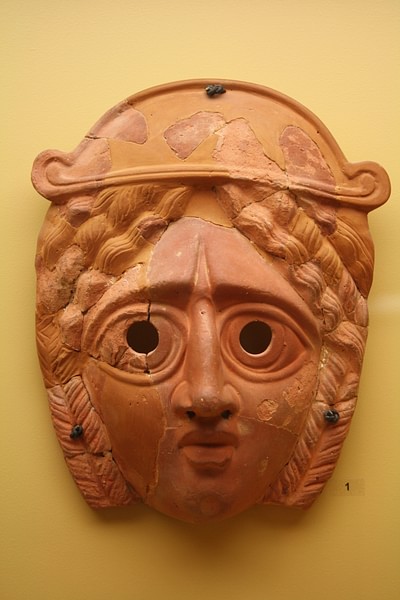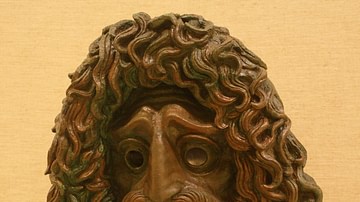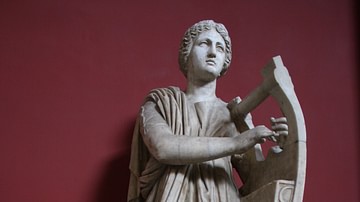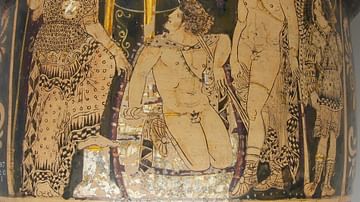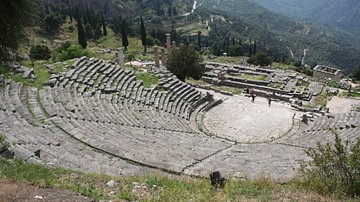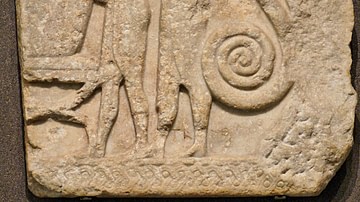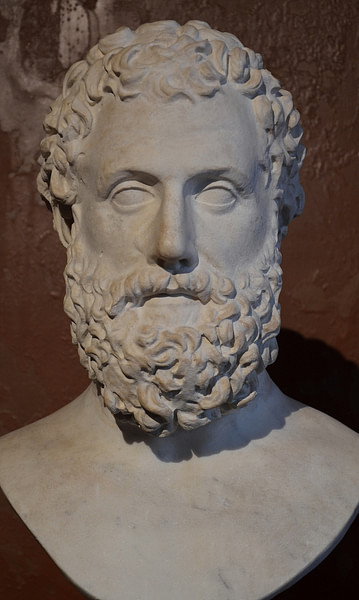
Aeschylus (c. 525 - c. 456 BCE) was one of the great writers of Greek Tragedy in 5th century BCE Classical Athens. Known as 'the father of tragedy', the playwright wrote up to 90 plays, winning with half of them at the great Athenian festivals of Greek drama. Perhaps his most famous work is Prometheus Bound which tells the myth of the Titan punished by Zeus for giving humanity the gift of fire. All of his surviving plays are still performed today in theatres across the world. An innovator of the genre, Aeschylus is said to have described his work as 'morsels from the feast of Homer'.
Aeschylus' Life
5th century BCE Athens was blessed with three great tragedians: Aeschylus, Euripides (c. 484 - 407 BCE), and Sophocles (c. 496 - c. 406 BCE). The senior of the three, Aeschylus was born in Eleusis in c. 525 BCE. Aeschylus' father was Euphorion, and ancient sources claim the family belonged to the aristocracy. Living through the Persian wars, Aeschylus almost certainly participated in such famous and decisive battles as Marathon and Salamis. His brother Kynegeiros was killed in the former battle and his other sibling Ameinias fought at the latter. Aeschylus' epitaph, said to have been self-penned, stated nothing of his success as a playwright but only that he had fought at Marathon. These experiences and the transformation of Athens' political structure as it embarked on the road to democracy greatly influenced the playwrights' work.
Other snippets of biography, which have survived from antiquity, reveal that Aeschylus was once prosecuted for revealing details of the secret Eleusinian mysteries cult but managed to prove his innocence. Sometime after 458 BCE Aeschylus travelled to Sicily, visiting Syracuse at the invitation of Hieron I, and around 456 BCE he died on the island in the town of Gela. Aeschylus' plays were already recognised as classics and their public performances were given particular privileges. His son Euphorion and nephew Philocles both became noted dramatists in their own right.
Aeschylus the Innovator
A Greek tragedy was typically performed at important religious festivals such as the City Dionysia where three playwrights each wrote three tragic plays and a satyr play to compete for a prize. Tragedy plays were restricted by certain conventions: the theme was almost always mythological with elements of religion and family affairs, the number of actors who could have speaking roles was limited (although they could play multiple characters), a chorus consisted of 12 or 15 singers, and all actors were males wearing masks.
An innovative playwright, Aeschylus was, according to Aristotle, responsible for adding a second actor for minor parts and, by including more dialogue into his plays, he squeezed more drama from the age-old stories so familiar to his audience. Aeschylus is also credited as the first to use the ekkyklema, a wheeled platform used to change stage scenery, and the mechane, a crane device used to lift actors. He was also noted for his extravagant costume designs and use of striking imagery.
The stories of Aeschylus' plays illustrate that there is no escape from the bad deeds of one's ancestors and divine retribution. Other themes which appealed to Aeschylus were the conflict between the individual and the state, between humans and the gods, and against the old enemy Time. Another thread which runs through Aeschylus' work is his consideration of the threat to reason and persuasion that violence brings.
As plays were submitted for competition in groups of four (three tragedies and a satyr play), Aeschylus often carried on a theme between plays, creating sequels which followed several generations of a single family. One such themed trilogy is Agamemnon, The Libation Bearers (or Cheoephori), and The Furies (or Eumenides), known collectively as the Oresteia. This trilogy model would be copied by contemporary and later playwrights and helped to earn Aeschylus his reputation as the founder of Greek Tragedy as we know it today.
Aeschylus' Works
Aeschylus wrote between 70 and 90 plays, of which six or seven survive complete along with various fragments of others, notably The Netfishers (Diktyoulkoi) and Spectators at the Isthmian Games (Isthmiastai). His first play was presented in c. 499 BCE and he claimed his first of 13 festival victories in 484 BCE. His complete surviving plays are:
- The Persians (472 BCE) - set after the Greek victory (less than a decade earlier) over the Persians at Salamis and Xerxes' return to Persia.
- Seven Against Thebes (467 BCE) - about the cursed Labdacids and the siege of Thebes. It is the third part of a trilogy which included Laius (part I) and Oedipus (part II).
- Suppliants (unknown date but after Seven Against Thebes, possibly c. 463 BCE) - about the Danaids myth. First in a trilogy, now lost, known as The Danaid Trilogy, part II being The Egyptians and part III The Danaids.
- Oresteia (458 BCE) - a trilogy about the aftermath of the Trojan War comprising Agamemnon, The Libation Bearers (Choephori), and The Furies (Eumenides). Proteus, the accompanying satyr play, does not survive.
- Prometheus Bound (c. 457 BCE) - this play is disputed by some scholars as the work of Aeschylus and it may have been staged by Euphorion in his father's name. It deals with Zeus' punishment of the Titan Prometheus, who stole fire from the gods and gifted it to humanity. It is the first part of a trilogy with part II being Prometheus Unbound and part III Prometheus the Fire Carrier, both now surviving only in fragments.
Below is a selection of extracts from Aeschylus' works:
Here is Prometheus, the rebel:
Nail him to the rock, secure him on this towering summit
Fast in the unyielding grip of adamantine chains.
It was your treasure that he stole, the flowery splendour
Of all-fashioning fire, and gave to men - an offence
Intolerable to the gods, for which he now must suffer.
(Strength speaks, Prometheus Bound, lines 5-10)
The bronze, iron, silver, gold hidden deep down - who else
But I can claim to have found them first? No one, unless
He talks like a fool. So, here's the whole truth in one word:
All human skill and science was Prometheus' gift.
(Prometheus speaks, Prometheus Bound, lines 499-502)
Now it is happening: threat gives place to performance.
The earth rocks; thunder, echoing from the depth,
Roars in answer; fiery lightnings twist and flash.
Dust dances in a whirling fountain;
Blasts of the four winds skirmish together,
Set themselves in array for battle;
Sky and sea rage indistinguishably.
The cataclysm advances visibly upon me,
Sent by Zeus to make me afraid.
(Prometheus speaks, Prometheus Bound, lines 1076-85)
May murder and devastation
Never come to tear this city,
To put a sword in the hand of Ares, father of tears,
To banish dancing and music
With the shout of civil war.
(Chorus, The Suppliants, lines 674-678)
And troubles followed like a sea rolling its waves onward;
One breaks, and it lifts the next, three heaped together,
Whose surge seethes around our city's hull;
And our barrier between life and death
Is no more than the width of a wall;
I fear for Thebes and her line of kings,
Lest all be overwhelmed together.
(Chorus, Seven Against Thebes, lines 758-64)
Alas for Persia's honoured name!
Alas for all that noble host,
The flower of manhood, Asia's boast,
By gods condemned to deadly shame!
Our land bewails the men she bore,
Slaughtered for Xerxes, who has fed
Hell's hungry jaws with Persian dead.
(Chorus, The Persians, lines 910-17)
